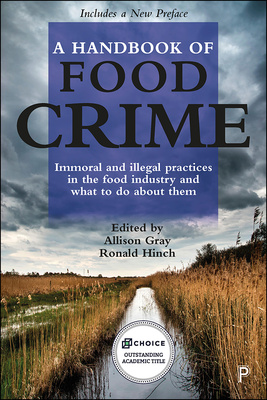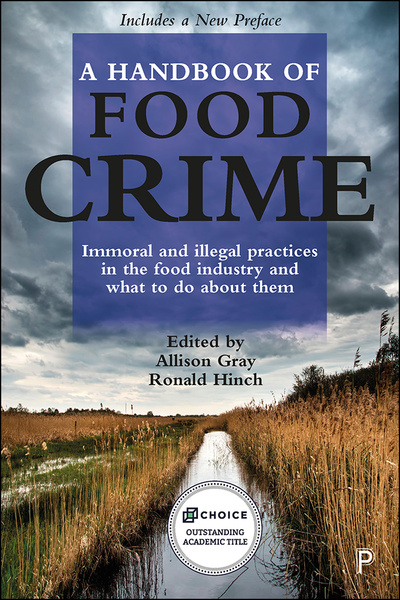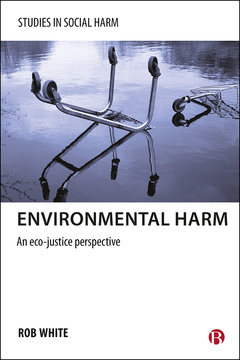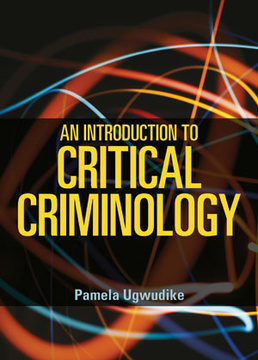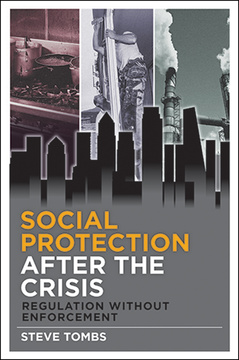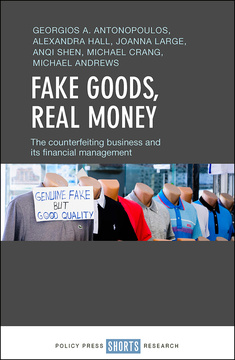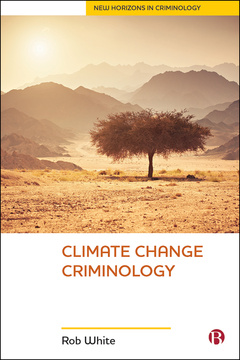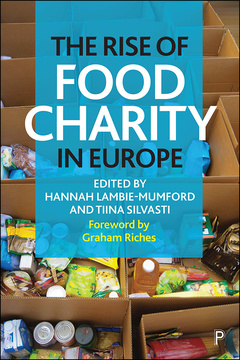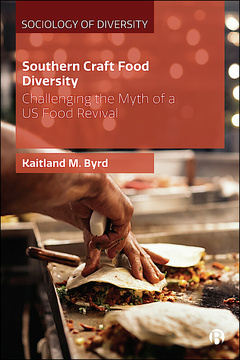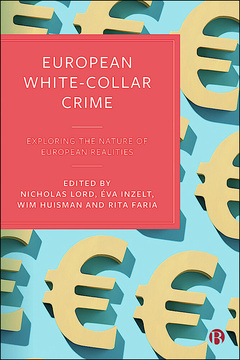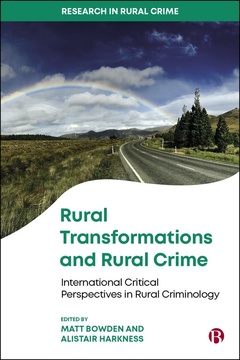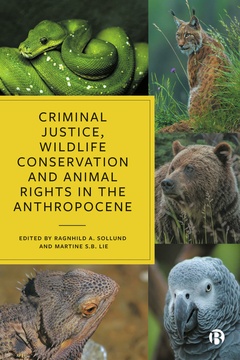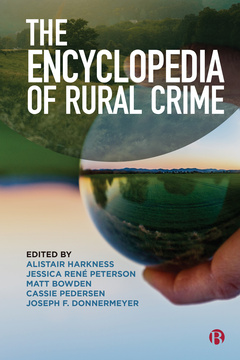A Handbook of Food Crime
Immoral and Illegal Practices in the Food Industry and What to Do About Them
Edited by Allison Gray and Ronald Hinch
Published
Oct 9, 2019Page count
458 pagesISBN
978-1447356288Dimensions
234 x 156 mmImprint
Policy PressPublished
May 9, 2018Page count
458 pagesISBN
978-1447336013Dimensions
234 x 156 mmImprint
Policy PressPublished
May 9, 2018Page count
458 pagesISBN
978-1447336037Imprint
Policy PressPublished
May 9, 2018Page count
458 pagesISBN
978-1447336044Imprint
Policy PressIn the news
On our blog: 'Why food crime can’t be ignored'
Winner of the Choice Outstanding Academic title award
Food today is over-corporatized and under-regulated. It is involved in many immoral, harmful, and illegal practices along production, distribution, and consumption systems. These problematic conditions have significant consequences on public health and well-being, nonhuman animals, and the environment, often simultaneously.
In this insightful book, Gray and Hinch explore the phenomenon of food crime. Through discussions of food safety, food fraud, food insecurity, agricultural labour, livestock welfare, genetically modified foods, food sustainability, food waste, food policy, and food democracy, they problematize current food systems and criticize their underlying ideologies.
Bringing together the best contemporary research in this area, they argue for the importance of thinking criminologically about food and propose radical solutions to the realities of unjust food systems.
"An excellent wide-ranging contribution to the field of criminology and green criminology in particular." Tanya Wyatt, University of Northumbria
“Provides helpful snapshots of various criminal and/or ethically dubious processes within local, national and global food systems. Those with an interest in one or more of these spheres will undoubtedly find this collection useful.” Criminal Law and Criminal Justice Books
Allison Gray is a PhD Candidate at the University of Windsor. She pursues a diverse range of research interests across the areas of food studies, green criminology, theoretical sociology, and the intersection of humanity, nonhuman animals, and the environment. She is especially keen on studying the sociology of food choice.
Ronald Hinch, PhD, is Professor Emeritus at the University of Ontario Institute of Technology. His research interests and publications include food crime, green criminology, critical criminology, criminological theory and violent crime with a special interest in serial homicide.
Introduction;
Section I: Thinking about food crime;
A food crime perspective ~ Allison Gray;
Food crime without criminals: Agri-good-safety governance as a protection racket for dominant political and economic interest ~ Martha McMahon,
Kora Liegh Glatt;
The social construction of illegality within local food systems ~ Marcello de Rosa, Ferro Trabalzi, Tiziana Pagnani;
Section II: Farming and food production;
Ethical challenges facing farm managers ~ Harvey S. James Jr.;
Chocolate, slavery, forced labour, child labour, and the state ~ Ronald Hinch;
Impact of hazards and pesticides on farmers and farming communities ~ Jinky Leilanie del Prado-Lu;
Section III: Processing, marketing, and accessing food;
Agency and responsibility: The case of the food industry and obesity ~ Judith Schrempf-Stirling, Robert Phillips;
The value of product sampling in mitigating food adulteration ~ Louise Manning, Jan Mei Soon;
Prohibitive property practices: The impact of restrictive covenants on the built food environment ~ Sugandi del Canto, Rachel Engler-Stringer;
Section IV: Corporate food and food safety;
Regulating food fraud: Public and private law responses in the EU, Italy and the Netherlands ~ Antonia Corini, Bernd van der Meulen;
Mass salmonella poisoning by the Peanut Corporation of America: Lessons in state-corporate food crime ~ Paul Leighton;
Food crime in the context of cheap capitalism ~ Joseph Yaw Asomah, Hongming Cheng;
Section V: Food trade and movement;
Crime versus harm in the transportation of animals: A closer look at Ontario’s ‘pig trial’ ~ Amy Fitzgerald, Wesley Tourangeau;
Coming together to combat food fraud: Regulatory networks in the EU ~ Richard Hyde, Ashley Savage;
Fair trade laws, labels, and ethics ~ Will Low, Eileen Davenport;
Section VI: Technologies and food;
Food, genetics and knowledge politics ~ Reece Walters;
Technology, novel foods and crime ~ Juanjuan Sun, Xiaocen Liu;
Food crimes, harms, and carnist technologies ~ Linnea Laestadius, Jan Deckers, Stephanie Baran;
Section VII: Green food;
Farming and climate change ~ Rob White, Jasmine Yeates;
Food waste (non)regulation ~ Michael A. Long, Michael J. Lynch;
Responding to neoliberal diets: School meal programs in Brazil and Canada ~ Estevan Leopoldo de Freitas Coca, Ricardo César Barbosa Júnior;
Section VIII: Questioning and consuming food;
Counter crimes and food democracy: Suspects and citizens remaking the food system ~ Sue Booth, John Coveney, Dominique Paturel;
Consumer reactions to food safety scandals: A research model and moderating effects ~ Camilla Barbarossa;
Resisting food crime and the problem of the ‘food police’ ~ Allison Gray.







